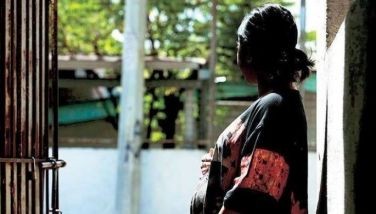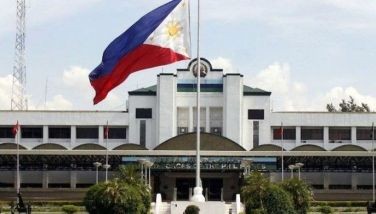US offers more intel aid to RP
October 24, 2005 | 12:00am
The United States is offering additional intelligence assistance to the Philippines to bolster the two countries’ fight against terrorism, officials said yesterday.
The offer was made by US State Department coordinator for counterterrorism Henry Crumpton during his meeting on Friday with Executive Secretary Eduardo Ermita and other Philippine anti-terrorism officials at Malacañang, an official who spoke on condition of anonymity said.
"The need for reliable intelligence and effective operations is important. Intelligence assistance is one window we are looking at to build Philippine capacity against terrorism," the official, who was present during the meeting, quoted Crumpton as telling Ermita.
Crumpton was in the Philippines on the last leg of a four-country trip in the region. He earlier visited Malaysia , Indonesia and Singapore to meet with security officials after the recent bomb attacks on Bali, which killed 23 people.
He warned on Friday that the Jemaah Islamiyah, al-Qaeda’s arm in Southeast Asia, is aiming to establish a pan-Islamic state in several countries stretching all the way from Morocco to Mindanao, and that it may be planning to use chemical and biological weapons.
Ermita told Crumpton of the need to improve the country’s intelligence capability "for we cannot operate blindly."
"Intelligence exchange and training lie at the core of our anti-terrorism efforts... US has very good experience in this... Abu Sabaya was a product of (RP-US) intelligence collaboration...," he said.
Crumpton said the US offer is centered on intelligence assistance, rule of law assistance and development assistance.
Ambassador-at-large Benjamin Defensor, chairman of the Asia-Pacific Economic Cooperation (APEC) Counter-Terrorism Task Force, confirmed that the offer was made "in an indirect way."
"Ambassador Crumpton congratulated us for our efforts against terrorism and we all recognized the need for a coordinated action, including in terms of intelligence," Defensor said in a telephone interview.
Ermita said during the meeting that the country would also like to seek additional fast boats and surveillance aircraft to enable law enforcement and anti-terrorism units to respond quickly on intelligence information.
"We are surrounded by big bodies of water...our problem down South really is good coverage of our waters. We compensate for this through good relations with our neighbors and cooperation on border management," he said.
He also said the US reward system has been very effective in neutralizing or capturing suspected terrorists. Ermita pointed out that President Arroyo has already formed the Anti-Terrorism Task Force, which he chairs, to allow faster coordination and communication with operational units.
Defensor also proposed the creation of a think tank or research center on terrorism, similar to those in Indonesia and Malaysia, composed of expert representatives from concerned sectors, "which will build institutional memory, undertake and validate security research, and provide policy to the highest agencies and authorities." — Paolo Romero
The offer was made by US State Department coordinator for counterterrorism Henry Crumpton during his meeting on Friday with Executive Secretary Eduardo Ermita and other Philippine anti-terrorism officials at Malacañang, an official who spoke on condition of anonymity said.
"The need for reliable intelligence and effective operations is important. Intelligence assistance is one window we are looking at to build Philippine capacity against terrorism," the official, who was present during the meeting, quoted Crumpton as telling Ermita.
Crumpton was in the Philippines on the last leg of a four-country trip in the region. He earlier visited Malaysia , Indonesia and Singapore to meet with security officials after the recent bomb attacks on Bali, which killed 23 people.
He warned on Friday that the Jemaah Islamiyah, al-Qaeda’s arm in Southeast Asia, is aiming to establish a pan-Islamic state in several countries stretching all the way from Morocco to Mindanao, and that it may be planning to use chemical and biological weapons.
Ermita told Crumpton of the need to improve the country’s intelligence capability "for we cannot operate blindly."
"Intelligence exchange and training lie at the core of our anti-terrorism efforts... US has very good experience in this... Abu Sabaya was a product of (RP-US) intelligence collaboration...," he said.
Crumpton said the US offer is centered on intelligence assistance, rule of law assistance and development assistance.
Ambassador-at-large Benjamin Defensor, chairman of the Asia-Pacific Economic Cooperation (APEC) Counter-Terrorism Task Force, confirmed that the offer was made "in an indirect way."
"Ambassador Crumpton congratulated us for our efforts against terrorism and we all recognized the need for a coordinated action, including in terms of intelligence," Defensor said in a telephone interview.
Ermita said during the meeting that the country would also like to seek additional fast boats and surveillance aircraft to enable law enforcement and anti-terrorism units to respond quickly on intelligence information.
"We are surrounded by big bodies of water...our problem down South really is good coverage of our waters. We compensate for this through good relations with our neighbors and cooperation on border management," he said.
He also said the US reward system has been very effective in neutralizing or capturing suspected terrorists. Ermita pointed out that President Arroyo has already formed the Anti-Terrorism Task Force, which he chairs, to allow faster coordination and communication with operational units.
Defensor also proposed the creation of a think tank or research center on terrorism, similar to those in Indonesia and Malaysia, composed of expert representatives from concerned sectors, "which will build institutional memory, undertake and validate security research, and provide policy to the highest agencies and authorities." — Paolo Romero
BrandSpace Articles
<
>
- Latest
- Trending
Trending
Latest
Trending
Latest
Recommended































